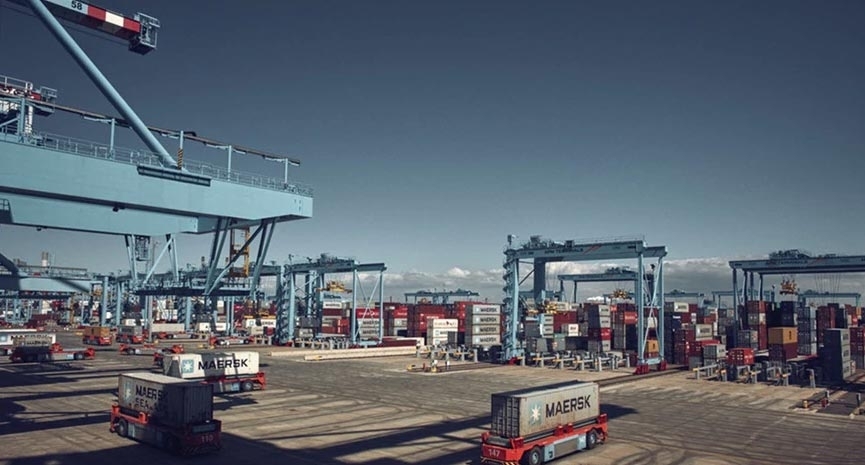A.P. Moller - Maersk posts 14% EBITDA increase in 2019
In its 2019 Annual Report, A.P. Moller - Maersk posted improved earnings and free cash flow, despite weaker market conditions and global container growth of only 1.4 percent.

February 20, 2020: In its 2019 Annual Report, A.P. Moller - Maersk posted improved earnings and free cash flow, despite weaker market conditions and global container growth of only 1.4 percent. In 2019, earnings before interest, tax, depreciation, and amortisation (EBITDA) improved 14 percent to $5.7 billion compared to 2018 and the EBITDA margin increased to 14.7 percent.
Revenue decreased slightly to $38.9 billion in 2019 from $39.3 billion. Free cash flow was $6.8 billion, compared to $5.1 billion last year and capital expenditure (CAPEX) declined by $1.2 billion to $2 billion in 2019. CAPEX discipline remains a key focus area reflected in the accumulated CAPEX guidance for 2020-2021 of $3-4 billion.
Meanwhile, global container trade growth on the East-West trades grew 2 percent in 2019. Import growth in the Middle East and Indian subcontinent declined marginally by 0.4 percent in 2019, while African imports grew by 4 percent.
“While we still need to improve returns, we delivered solid progress in our financial performance in 2019 in spite of a backdrop of weak trade growth, ongoing trade tensions and geopolitical uncertainty in many markets.” Søren Skou CEO A.P. Moller - Maersk #MaerskResults #Maersk pic.twitter.com/AWZIfVMe1B
— Maersk (@Maersk) February 20, 2020
On February 19, A.P. Moller - Maersk reached an agreement to acquire Performance Team, a US-based warehousing and distribution company, to further strengthen its capabilities as an integrated container logistics company, within warehouse fulfillment services, e-commerce and inland transport. Performance Team has a track record of profitable growth of 17 percent per year for the last four years, and revenue for 2019 of $525 million.
“Despite weaker market conditions, A. P. Moller - Maersk was able to improve profitability and cash flow. Our cash return was healthy, and we continued the reduction of net interest-bearing debt, leading to a further deleveraging of $3.3 billion over the year. It gives us a solid starting point for 2020 to further expand our end-to-end offering within container logistics while at the same time managing the market challenges that are obviously out there,” said Soren Skou, CEO of A.P. Moller - Maersk.
Looking back on 2019, the company passed several milestones, including the successful listing of Maersk Drilling, which marks the completion of the separation of the energy businesses. It completed the integration of Hamburg Süd and the reorganisation of the company from the conglomerate structure of the past, to the integrated and focused company structure of the future.
In Ocean, EBITDA in 2019 increased 15 percent to $4.4 billion and the EBITDA margin of 15.3 percent increased by 2 percentage points, driven by a lower cost base. Unit cost at fixed bunker decreased by 1.7 percent, mainly due to improvements in capacity management and foreign exchange rate developments.
A.P. Moller - Maersk expects an EBITDA of around $5.5 billion, before restructuring and integration costs. The organic volume growth in Ocean is expected to be in line with or slightly lower than the estimated average market growth of 1-3 percent for 2020.
In 2019, EBITDA in Logistics & Services increased 24 percent to $238 million with an EBITDA margin of 4 percent, while revenue decreased slightly to $6 billion from $6.1 billion, driven by a decrease in sea and air freight forwarding activity, which was only partly offset by an increase in warehousing and distribution.
Terminals & Towage reported an increase in EBITDA of 11 percent to $1.1 billion with an EBITDA margin of 28.4 percent in 2019. Revenue increased 3.2 percent to $3.9 billion. In gateway terminals, EBITDA increased by 17 percent to $902 million, reflecting an increase in EBITDA margin to 28 percent and revenue increased by 4.1 percent to $3.2 billion. The positive development was driven by a ramp-up of the new terminal in Moin, Costa Rica, higher volumes, higher storage income and reduction in selling, general and administrative expenses (SG&A).
Net interest-bearing debt decreased through the year to $11.7 billion from $15 billion in 2018. In 2019, $1.3 billion was distributed to shareholders via ordinary dividends and share buy backs. An ordinary dividend equal to $469 million was paid to shareholders and as part of the share buy-back programme announced in May 2019, the company bought back shares worth $791 million.
The strategic focus of 2019 was on improving the financial performance on Ocean and creating a better customer experience through increased reliability, improved customer experience and introduction of online services and products such as Maersk Spot, a unique product in the market that offers price and loading guarantee. Also during the year, we took further steps in the integration of the business on a structural level and how we go to market.
“While we still need to improve returns, we delivered solid progress in our financial performance in 2019 while progressing the business transformation, in spite of weak trade growth, ongoing trade tensions and geopolitical uncertainty in many markets,” explained Søren Skou.
Synergies harvested from the Hamburg Süd acquisition and the integration of transport and logistics reached $1.2 billion, which is above the expected target. The long-term target on return on invested capital after tax (ROIC) grew to 3.1 percent in 2019, compared to 0.2 percent the year before.
The outlook and guidance for 2020 is subject to significant uncertainties and impacted by the current outbreak of the Coronavirus in China, which has significantly lowered visibility on what to expect in 2020. As factories in China are closed for longer than usual in connection with the Chinese New Year and as a result of the Coronavirus, we expect a weak start to the year.
The guidance for 2020 is also subject to uncertainties related to the implementation of IMO 2020 and the impact on bunker fuel prices and freight rates combined with the weaker macroeconomic conditions and other external factors.


